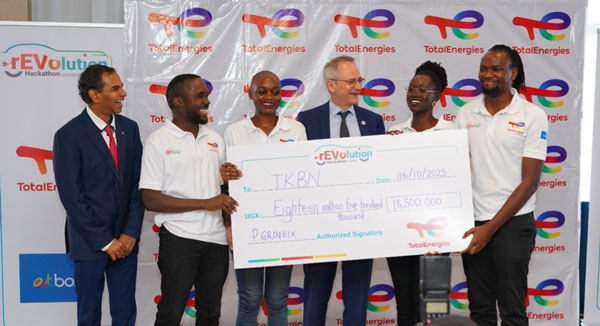
Kampala, Uganda | THE INDEPENDENT | TotalEnergies E&P has called for a discussion on infrastructure for electric vehicles so as to enhance Uganda’s energy transition process.
The main infrastructure for EVs is the charging stations that currently are almost non-existent in the country, with a few vehicle owners like Kiira Motor Corporation and private motorists having to install personal ones.
the partnership between TotalEnergies E&P Uganda (TEPU) and Outbox Uganda, a tech innovation entrepreneurship support center aims to gather innovative views through an innovation challenge (Hackathon).
Philippe Groueix, TEPU Uganda General Manager, specifically says it is hard for anyone to invest in the infrastructure yet in Uganda because it will be idle since there are almost no EVs in the country.
The participants in the hackathon were challenged to propose solutions that would assist in identifying optimal locations for Electric Vehicle charging points in Kampala.
While recognizing the challenge winners in Kampala, Groueix also anticipated that the first investments in charging points could sooner or later close down due to the difficulty in aligning the convenient charging times for motorists and the time the station operators should open.
This, he said, is because unlike fueling a car, charging takes hours, making it convenient for vehicle owners to charge them when they are either at home sleeping, or at work.
Groueix, however, said that this will only last the transitional period and then stabilize, though for Uganda, the high costs of the EVs mean this will take even longer.
“Addressing today’s carbon neutrality challenge requires a collective focus on innovation. In Uganda, the Company is part of the energy cluster on e-mobility think tank and is supporting innovation in line with e-mobility,” said the GM.
An innovative solution to use artificial intelligence to identify optimal locations for the installation of EV charging points won the premier ‘TotalEnergies Uganda rEVolution hackathon’.
Wendy Nabasanga, the Chief of Staff at Outbox said their motive to partner with TotalEnergies was to contribute to energy migration, by helping the company in its course of establishing charging points.
Nabasanga said the three-month period for the hackathon was not enough for the participants to do more with their ideas.
However, the projects will be handed over to TotalEnergies which can then employ experts to develop them into real usable solutions.
The winning solution earned the TBKN, a team of data and geospatial scientists, 18.5 million shillings, while ISBAT University Machine Learning and Artificial Intelligence students, the runners-up, won 11.1 million.
Martin Kenyi, the ISBAT team leader said among the challenges they faced was the lack of adequate data at some places, though Uber and Makerere University were helpful.
Over 400 Ugandans between the ages of 18 and 45 submitted applications to participate in the challenge implemented by Outbox Uganda on behalf of TotalEnergies Uganda from July to September 2023.
“This hackathon demonstrated that young people still have a role to play in addressing societal challenges in partnership with the private sector.
We remain steadfast in our commitment to ensure that the solutions selected can be considered for operationalization by TotalEnergies in Uganda and other mobility actors in Uganda,” noted Richard Zulu, Team Principal, Outbox Uganda.
An initial evaluation of all submissions resulted in a shortlist of 16 teams (comprising 4 members each) which were tasked to propose innovative ideas using the data provided on Kampala city’s road, electricity, and traffic networks.
The teams also received mentorship and coaching to refine their ideas before presenting them to a panel of judges.
The proposals were evaluated based on several criteria including the innovativeness of ideas, team composition, presentation, and business fit.
Tying in third position was Data Knight and Shalom who received 3.7 million shillings each.
Over 400 Ugandans between the ages of 18 and 45 submitted applications to participate in the challenge implemented between July and September 2023.
An initial evaluation of all submissions resulted in a shortlist of 16 teams of four members each, who were tasked to propose innovative ideas using the data provided on Kampala city’s road, electricity, and traffic networks.
The teams also received mentorship and coaching to refine their ideas before presenting them to a panel of judges.
****
URN
 The Independent Uganda: You get the Truth we Pay the Price
The Independent Uganda: You get the Truth we Pay the Price



